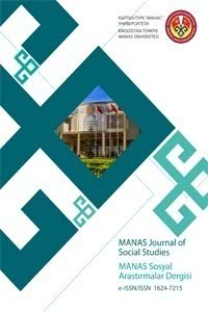KIRGIZİSTAN OKULLARINDAKİ GÜNLÜK NOT VERME YÖNTEMİ HAKKINDA ÖĞRETMEN VE ÖĞRENCİ GÖRÜŞLERİ
Öğretmenin öğrencilere günlük not verdiği her sınıfa ait “Journal” adı verilen sınıf defteri vardır. Her dersin öğretmeninin bu defteri derse götürmesi ve defterin kendi dersine ait bölümlerini doldurması gerekir. Öğretmen, ders sonunda öğrencilere işlediği konularla ilgili sözlü soru sorar. Soru sormak için tesadüfi olarak 3-5 öğrenci seçer ve bu öğrencilere journal defterine not verir. Araştırmanın amacı, Kırgız okullarında öğretmen ve öğrencilerin geleneksel günlük not verme yöntemine karşı tutumlarını ortaya koymaktır. Veri toplamak için öğretmen ve öğrenci anketi hazırlanmış ve Kırgızistan-Bişkekte 345 öğretmene ve 324 öğrenciye uygulanmıştır. Verilerin analizinde frekans ve kay kare testi kullanılmıştır
Anahtar Kelimeler:
günlük not verme, Kırgız okulları, öğretmenler, öğrenciler
PERCEPTIONS OF TEACHERS AND STUDENTS TOWARDS THEIR DAILY EVALUATION PROCESS AT KYRGYZ SCHOOLS
Teachers have a notebook called as journal at Kyrgyz schools. Teacher need to have this notebook in every course sessions. Every teacher is responsible to fill out the appropriate places in this notebook. At the end of the each course hour, teachers ask questions to students about instructed subjects. Teacher selects students randomly to ask questions. Teachers give appropriate point according to the students answer and mark on the journal notebook. The purpose of this survey is to explore the perceptions of students and teachers towards their traditional daily evaluation experiences. Two forms of questionnaire: one for students and another one for teachers were used for data collection from 345 teachers and 324 students in Bishkek, Kyrgyz Republic. Frequencies and Chi Square tests were used for analysing data
Keywords:
daily evaluation, Kyrgyz schools, teachers, students,
___
- Alimbekov, A. (2001) Kırgız Cumhuriyeti ve Eğitim Sistemi Hakkında Genel Bilgi
- (General Views on The Kyrgyz Republic and Education System), Türk Yurdu 21 (171), 15. Candemir, M. (2001) Kırgızistan Tarımının Genel Ekonomik Yapısı (The General Economic Structure of Kyrgyzstan Agriculture), Türk Yurdu 21 (171), 48-52.
- Erginer, E. (2000) Öğretimde Planlama ve Değerlendirme (Planing and Evoluation of İnstruction), Ankara: Anı Yayınları.
- Gosch, E. (2006) Tests Help What's Learnt Stay Learnt, The Australian, 18.07.2006, pg.6.
- Gözütok, F. Dilek (2000) Öğretmenliğimi Geliştiriyorum (I Am Developing My Teaching Skills), Ankara: Siyasal Kitabevi.
- Ibrayeva, N., Toktomambetov, A., Mambetova, Z. (1996) Baştalgıç Bilim Berüünün
- Mamlekettik Standardı (Standardization of Public Primary School Education), Bişkek: Çınar. K.R. Uluttuk Statistika Komitei (2006) Kırgız Respublikasındagı Bilim Berüü Cana İlim
- (Education and Science in Kyrgyz Republic), Bişkek: K. R. Uluttuk Statistika Komitei. Küçükahmet, L. (2005) Öğretimde Planlama ve Değerlendirme (Planing and Evoluation of İnstruction), Ankara: Nobel Yayınları
- Özdemir, S. (2001) Kırgızistan’da Sosyal ve Kültürel Hayat İle İlgili Bazı İzlenimler
- (Some Views on Social and Cultural Life in Kyrgyzstan), Türk Yurdu 21 (171), 92-93. Özdemir, S. & Yalın, H. İ. (2002) Mugallimdik Kesipke Girişüü (Introduction to Teaching Profession), Bişkek: Manas University.
- Rysalieva, S. DJ. & Ibraeva, G. (1999) Educational Financing and Budgeting in
- Kyrgyzstan (working document), Paris: UNESCO. The Ministry of Education and Cultures (2001), The report on development of education
- In the period 1991-2001yy., Bişkek: The Ministry of Education and Cultures of the Kyrgyz Republic, http://www.ibe.unesco.org/International/ICE/natrap/Kyrgyzstan.pdf
- ISSN: 1694-7215
- Yayın Aralığı: Yılda 4 Sayı
- Başlangıç: 2001
- Yayıncı: Kırgızistan Türkiye Manas Üniversitesi
Sayıdaki Diğer Makaleler
YAVUZ TURGUL’UN GÖNÜL YARASI FİLMİNİN GREİMAS’IN EYLEYENSEL ÖRNEKÇESİNE GÖRE ÇÖZÜMLENMESİ
TÜRKİYE’DE ORTAÖĞRETİM ÖĞRENCİLERİNİN TARİH KAVRAMLARINI KAZANMA DURUMU VE DEĞERLENDİRİLMESİ
TÜRKİYE’DE MADENCİLİK SEKTÖRÜNÜN GİRDİ-ÇIKTI ANALİZİ YÖNTEMİYLE İNCELENMESİ
OKUL - AİLE İŞBİRLİĞİ VE ÖĞRENCİ BAŞARISI ÜZERİNE BİR TARAMA ÇALIŞMA
ORTAK BAŞVURU METNİ’NE UYGUN TÜRKÇE ÖĞRETİMİNİN BAŞARIYA VE TUTUMA ETKİSİ
ÇUY BÖLGESİNDE BULUNMUŞ GÖKTÜRK DÖNEMİNE AİT İKİ HEYKELİ YENİDEN DEĞERLENDİRMEK
KIRGIZİSTAN OKULLARINDAKİ GÜNLÜK NOT VERME YÖNTEMİ HAKKINDA ÖĞRETMEN VE ÖĞRENCİ GÖRÜŞLERİ
ÖĞRETMEN DAVRANIŞLARININ YARATICI DÜŞÜNME BECERİLERİNİN GELİŞİMİNE KATKISI
